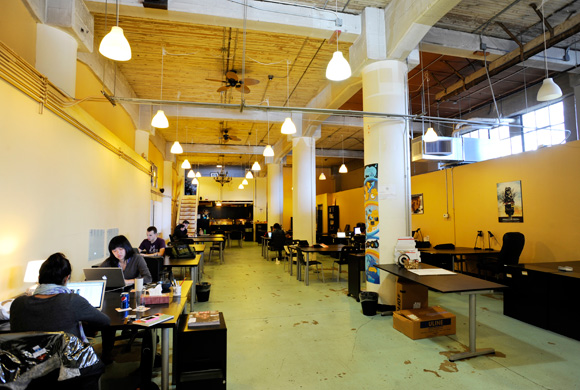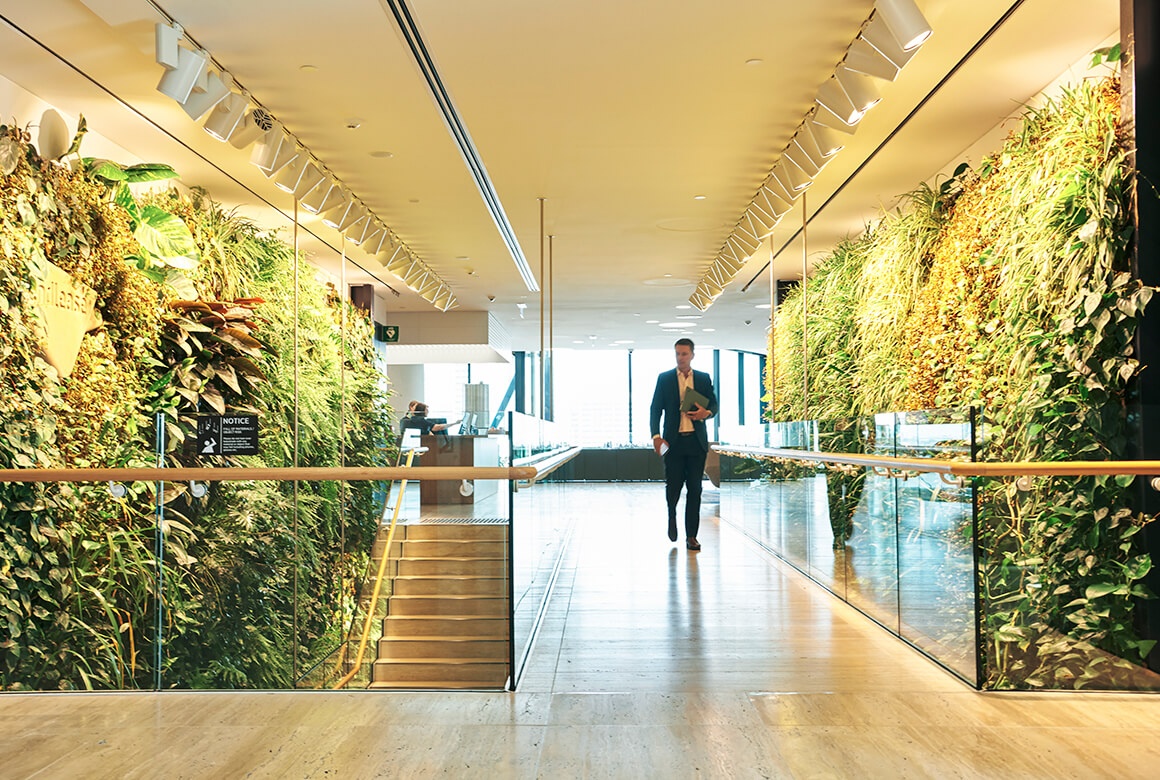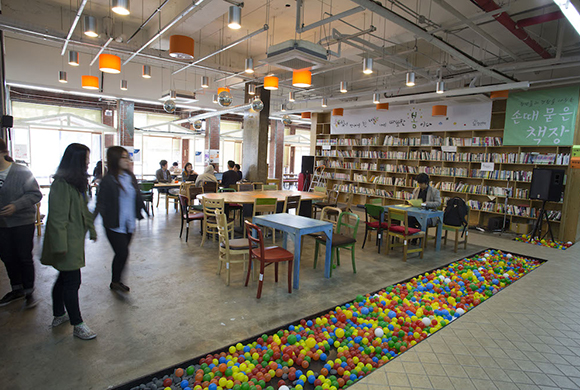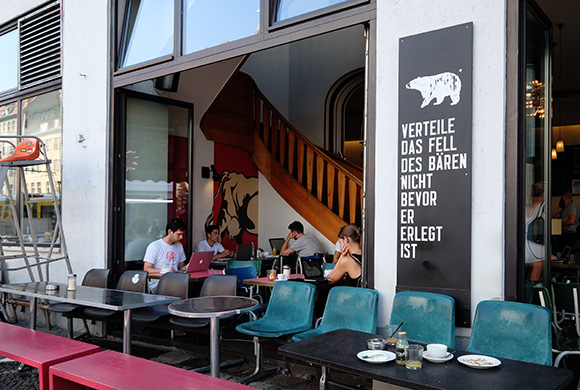Workplace
Feb. 5, 2018
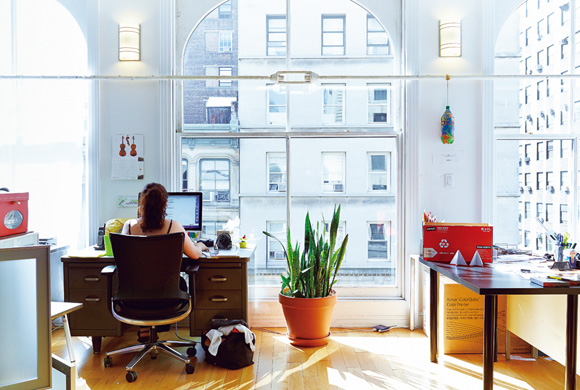
An unusual matching to contribute to society
A working space for people with a commitment to environmental protection
[Green Space] New York, USA
Located in Manhattan, Green Space is a coworking space where people committed to environmental conservation gather. There are currently about 100 members. With an excellent location convenient for transportation, people come from New Jersey, Long Island, Brooklyn, Queens and Pennsylvania. They represent many different kinds of activities. Other people are working on poverty issues. Even with the green focus, there are entrepreneurs, people from NPOs and freelancers here.
Green Spaces co-founder Marissa Feinberg was a member of the environmental conservation discussion group Green Leaders Global. “I started thinking about the contact between the people who gathered at the meetings,” she says. “I thought that if there were a place where they could interact on a more daily basis, interesting matches could happen.” This was the concept behind Green Spaces: providing these people with a workplace. Before long, the members began to spontaneously create communities, and collaboration began within Green Spaces.
However, Green Spaces was not simply a company providing a place. Ms. Feinberg also took on the role of supporting the matching of the members.
“It often happened that I would get an email of just a few lines asking me if I could look for someone and introduce them,” Ms. Feinberg says. “For example, I might introduce a startup-company member with a member who is a lawyer. With this place as the origin, business can start right from scratch.”
 In the open lounge space, there are varying membership
contracts for the use of the desks.
In the open lounge space, there are varying membership
contracts for the use of the desks.
Established: 2008
Income: Less than $1million
Employees: 1
http://greenspaceshome.com
 Marissa Feinberg
Marissa Feinberg
Co-Founder
After graduating from Syracuse University, she was involved in corporate PR, marketing and social venture start-ups. In 2008 she was involved in the planning for the establishment of Green Spaces.
Great care is taken about things that could be an obstacle to matching. Member candidates must first have an interview. First is a hearing about their activities and work style. Next is a screening, to see if the candidate has the level of thinking about mutual respect needed to share a work space. “In a normal office there might be 100 staplers, but here where we share the space there are only five,” Ms. Feinberg says. In this way, Green Spaces ensures that it gathers appropriate members.
A clear image of who is here, and what they are doing, is the one method needed for matching. The photos mounted on the walls are the works of a member who is both running a company and an active photographer. Exchanges via the Net are also popular, with the mailing list having 15,000 members and the Facebook group 600. Work Exchange sees members working on a rotation basis in contributing to Green Spaces management. The usage fee includes the benefit of several free days, but there are other merits as well. “It’s a chance for them to deepen their friendship with the other members,” Ms. Feinberg says. “I also think that the experience of taking ownership of tasks of Green Spaces is a good one. You become a part of the space, and feel that you are a member of the team.
There are also opportunities at Green Spaces for contact with the outside. The include being invited to environmental events, presentation events for investors, and others. Recently, large corporations who want to conduct environmental marketing have several employees staying here as a kind of branch office. The room design really does give the feeling of the “ecology” theme. An old office building was used, with a minimum of remodeling work done. It was the brick walls that were especially appealing to Ms. Feinberg. The furniture is all used items, and the chairs and desks are all of different designs. All of them came from universities or corporations. The conference rooms, which were designed by local artists, are finished in wood, making them spaces full of texture.
Green Spaces was founded five years ago. Now it is widely known as an environmental working space, and has expanded to a new space in Colorado as well. The number of member applicants grows daily, and at the moment all desks are full.
“What the members want is not a work space but a community,” Ms. Feinberg says. “They are committed to the same issue, and work in a community where they can sometimes disagree and sometimes cooperate. If it’s just working, then they can do that at home. But people get lonely being alone, and there’s no one to discuss things with. To resolve the issues we are facing, it’s important to have the community where you can exchange ideas and get feedback.
From WORKSIGHT 05(2013.12)
 The interior concept is literally “ecology.” Unused furniture is
collected and reused.
The interior concept is literally “ecology.” Unused furniture is
collected and reused.
 Inside a meeting room. Even if people do like working in open spaces, there is a need at times for privacy, or for bouncing ideas off another. The room can be used depending on the person’s contract. For a monthly fee of $550, a member gets their own desk, free Wi-Fi and five hours use of a meeting room.
Inside a meeting room. Even if people do like working in open spaces, there is a need at times for privacy, or for bouncing ideas off another. The room can be used depending on the person’s contract. For a monthly fee of $550, a member gets their own desk, free Wi-Fi and five hours use of a meeting room.
 Recycled transport palettes have been used as partitions.
Recycled transport palettes have been used as partitions.






